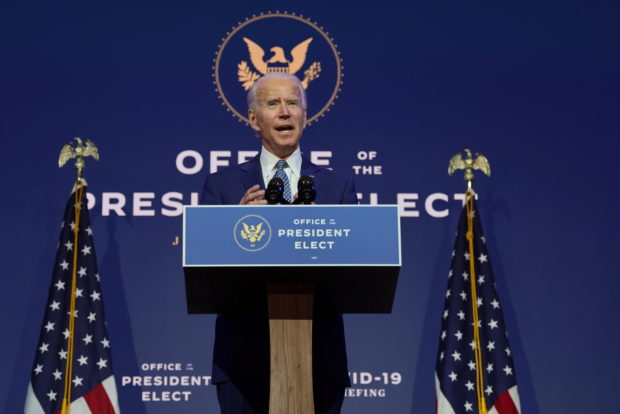South Korea sees Biden win as good news for military cost-sharing dispute

U.S. President-elect Joe Biden speaks to reporters about efforts to confront the coronavirus disease (COVID-19) pandemic after meeting with members of his Transition COVID-19 Advisory Board in Wilmington, Delaware, U.S., November 9, 2020. REUTERS/Jonathan Ernst
SEOUL — With Joe Biden’s projected victory in the U.S. presidential election, South Korean officials are expecting a win of their own in a drawn-out, multi-billion dollar dispute with Washington over the cost of thousands of U.S. troops on the peninsula.
Officials and experts in Seoul don’t expect Biden to entirely drop the demand that South Korea pay more toward maintaining the roughly 28,500 U.S. troops that are stationed in the country as a legacy of the technically unfinished 1950-1953 Korean War.
But Biden has promised not to use the troop presence to “extort” South Korea, and South Korean government sources say they anticipate his administration would agree to a deal close to Seoul’s proposal to pay 13% more or around $1 billion per year.
Outgoing U.S. President Donald Trump demanded much as $5 billion as part of a broader push to get allies to contribute more towards defense.
A Biden campaign spokesman declined to comment, and South Korean officials say it’s unclear how deeply his team has thought about the exact outlines of a new Special Measures Agreement (SMA).
Article continues after this advertisement“But the 13% increase discussed in past negotiations could be considered reasonable,” said one South Korean government official, who spoke on condition of anonymity to discuss diplomatic negotiations.
Article continues after this advertisement“We will know more when we actually sit down with their team after the new administration names a new negotiator or reappoints the incumbent, but at least there is more predictability now and a Biden White House wouldn’t veto a nearly done deal at the last minute,” the official added.
In April, Reuters reported Trump had rejected that 13% proposal, which was seen as probably Seoul’s best offer ahead of its parliamentary elections that month.
Strained relations
The impasse has strained the alliance in almost unprecedented ways, experts say. It comes as North Korea pushes ahead with its weapons programs, including state-of-the-art weapons designed to target South Korea, as well as long-range, nuclear-capable missiles that may now put the entire United States within range.
In early 2019, South Korea and the United States were forced to sign an SMA covering only one year instead of the usual five amid ongoing disagreements. But that short-term deal, under which South Korea agreed to pay 8.2% more, or about 1.0389 trillion won ($920 million) per year, expired earlier this year with no new agreement.
One of the most tangible results of the breakdown in the talks was the roughly 4,000 South Korean workers on U.S. bases furloughed as a result of the failure to reach a deal by an April 1 deadline.
Eventually, those workers were able to return to work under stop-gap agreements, but the ongoing deadlock led U.S. Forces Korea to warn in October those workers could once again be placed on unpaid leave early next year if no agreement is made.
One Western diplomat, speaking on condition of anonymity to discuss the U.S.-South Korea alliance, said the dispute cast a near-constant shadow over many of the two countries’ discussions on other issues including North Korea and China.
Trump’s view that wealthy South Korea, which has an economy larger than Australia’s, is taking advantage of the United States was met in Seoul by a perception that Washington has become a transactional partner with unreasonable demands.
Ahead of the Nov. 3 election, Biden vowed not to use the threat of reducing U.S. troop levels in South Korea as a bargaining chip.
“As President, I’ll stand with South Korea, strengthening our alliance to safeguard peace in East Asia and beyond, rather than extorting Seoul with reckless threats to remove our troops,” Biden wrote in an unprecedented op-ed published on Oct. 30 in South Korea’s Yonhap news agency.
Cho Tae-yong, a former deputy national security adviser who worked with many Biden aides, said issues around U.S. troops and their costs would be “substantially” resolved under Biden.
“Biden’s victory is a source of relief when it comes to alliance issues,” he said.